This report investigates the current state of patriotism in the United States and its relationship to hope for the country’s future. Drawing upon data from a national survey conducted by Archbridge Institute’s Human Flourishing Lab, the findings reveal that most Americans maintain a positive national identity. However, the analysis also uncovers notable differences in patriotism across age groups and political ideologies. Critically, this report establishes a positive association between patriotic attitudes and national hope that persists consistently across age and political categories, highlighting the potential role of national pride in fostering the positive and agentic mindset needed to address societal challenges such as political polarization, social distrust, and pessimism.
KEY INSIGHTS
- Most Americans (81%) are proud to be American. Among adults aged 60 and over, over 90% of liberals, moderates, and conservatives are proud to be American.
- Patriotism decreases with age across all political ideologies. However, the decline is most pronounced among younger liberals. Only 47% of liberals under the age of 30, compared to 75% of conservatives in that age group, are proud to be American.
- Just over half of Americans (56%) are hopeful for the future of the nation.
- Among adults aged 60 and older, liberals (76%) are more hopeful for the future of the nation than conservatives (61%). Among adults under the age of 30, conservatives (59%) are more hopeful for the future of the nation than liberals (47%).
- National pride is the strongest predictor of national hope; 64% of people who are proud to be American, compared to 27% of those who are not proud to be American, are hopeful for the future of the nation.
- The positive association between national pride and national hope is observed across political ideology and age groups.
INTRODUCTION
As humans, we are inherently social beings, and part of our sociality involves a natural tendency to form and maintain group bonds. This group-oriented nature is often viewed in a negative light, as it can sometimes lead to prejudice, discrimination, and violence, particularly when other groups are perceived as a threat. However, it is crucial to recognize that our inclination towards group affiliation also has numerous benefits. It fosters social trust, encourages individuals to unite around common goals, and offers the sense of existential meaning that comes from perceiving oneself as a significant contributor to a family, organization, or cultural group that transcends the limits of one’s mortality.
When individuals hold a positive attitude about a group they belong to, known as a positive group identity, they are more likely to maintain a hopeful outlook on life. A positive national group identity may therefore contribute to the cultivation of hopeful attitudes about the future of the nation.
Understanding factors that contribute to hope is important because hope is a critical driver of individual and societal wellbeing. Hopeful individuals are not only optimistic about the future but also possess a strong belief in their ability to improve their lives, which energizes them to persevere through adversity, remain flexible in devising effective strategies to reach their goals, and quickly adapt when faced with obstacles or setbacks. Moreover, hopeful people are inspired to pursue goals that provide meaning and purpose. Consequently, hope has been linked to success in various domains, including education, career, and athletics.
The impact of a hopeful mindset extends far beyond individual achievement. Hopeful individuals are motivated to make positive contributions to their families, communities, and society at large. Furthermore, hope is positively associated with tolerance for others, a key component of pluralism, as well as creativity and innovative problem-solving. Finally, hope is contagious, spreading from one person to another.
To better understand the current state of national pride and hope in the United States, and to explore how these two factors relate to one another, I utilized data from a nationally representative survey of just over 2,000 American adults conducted by the Human Flourishing Lab. Participants were asked to report their level of agreement with statements regarding their national pride and their hopefulness for the future of the country. By examining these connections, I aim to shed light on the potential role of national pride in fostering a hopeful outlook and, in turn, contributing to societal flourishing and human progress.
WHO IS PROUD TO BE AN AMERICAN
Most Americans possess a positive national identity, with 81% expressing pride in being American. However, the level of national pride varies notably across age groups and political ideologies. Americans aged 60 and older and those who identify as politically conservative exhibit the highest levels of patriotism, with 90% or more of individuals in these groups expressing pride in their American identity. In contrast, Americans under the age of 30 and those identifying as politically liberal are the least likely to be proud to be American, with 59% of young adults and 64% of liberals expressing national pride.
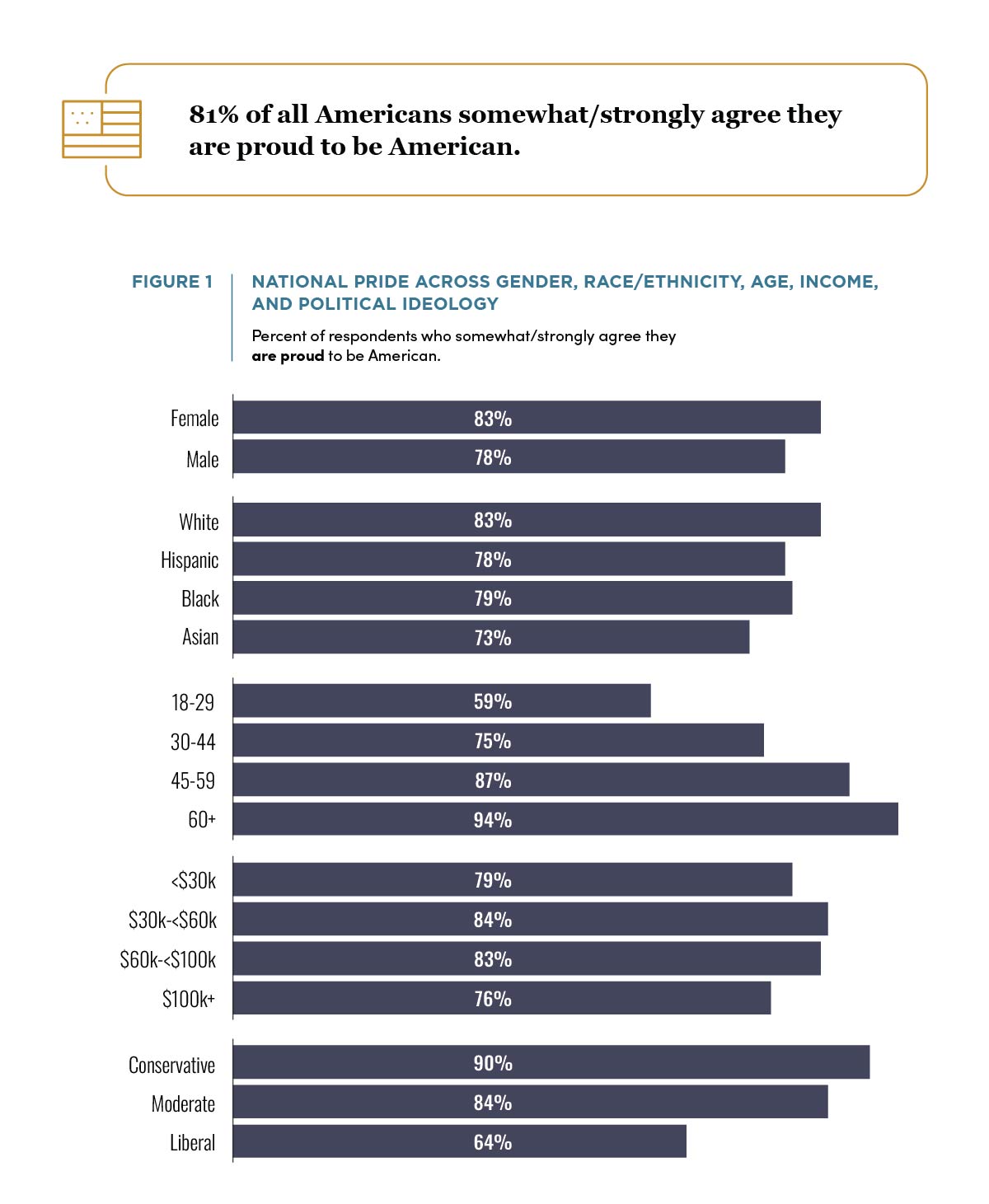
A closer analysis of the data reveals that the differences in patriotism across political ideologies are strongly related to age. Among Americans aged 60 and older, the disparity in national pride between liberals, moderates, and conservatives is minimal, with over 90% of individuals in each group expressing pride in being American. In every other age group, there is a large patriotism gap, with liberals being far less likely to express pride in being American compared to their conservative and moderate counterparts.
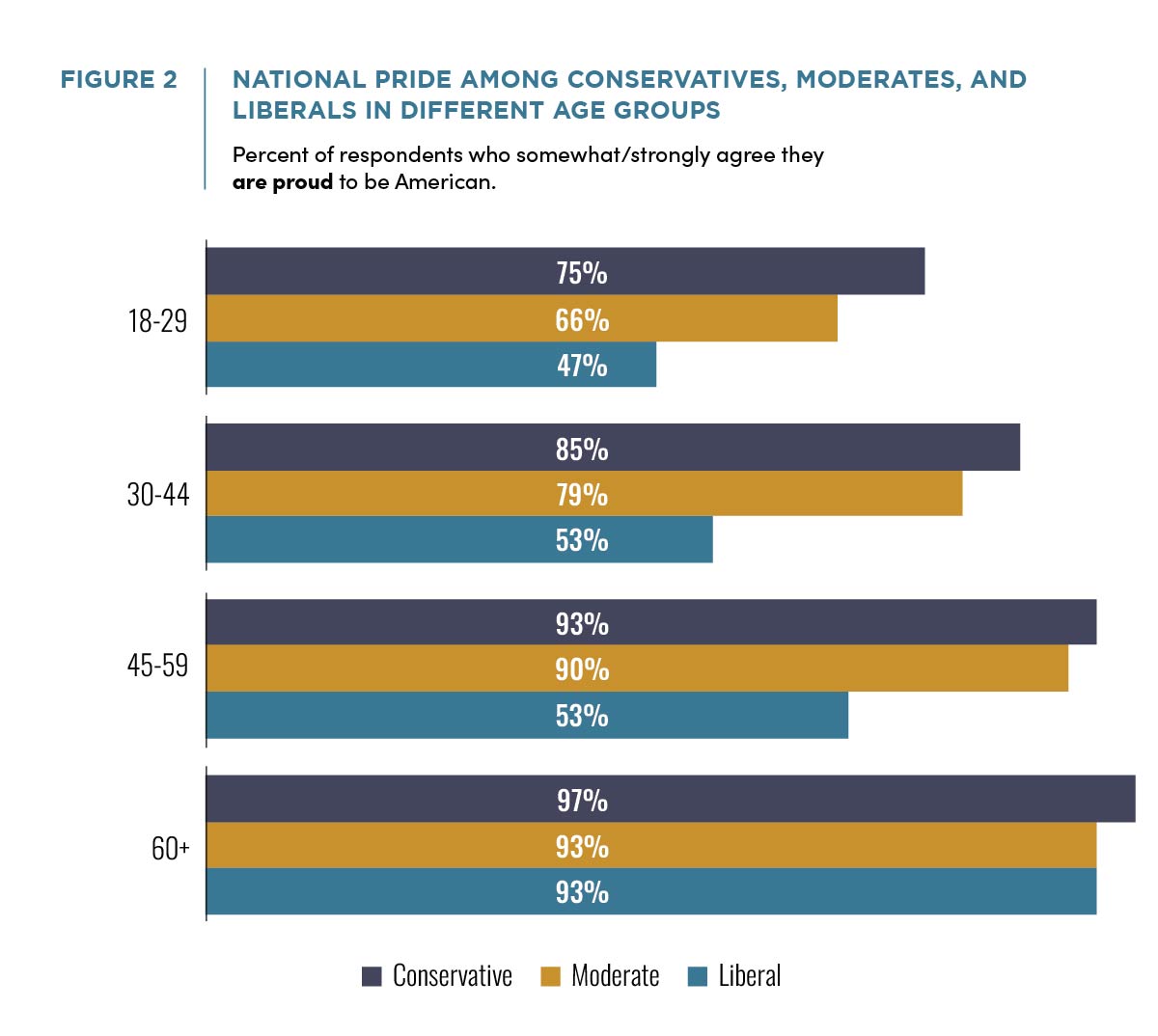
WHO IS HOPEFUL FOR THE FUTURE OF AMERICA?
The percentage of Americans who are hopeful for the nation’s future (56%) is lower than those who are proud to be American (81%). In addition, there is much greater consensus across age groups and political ideologies when it comes to hopeful attitudes about the future of the nation.
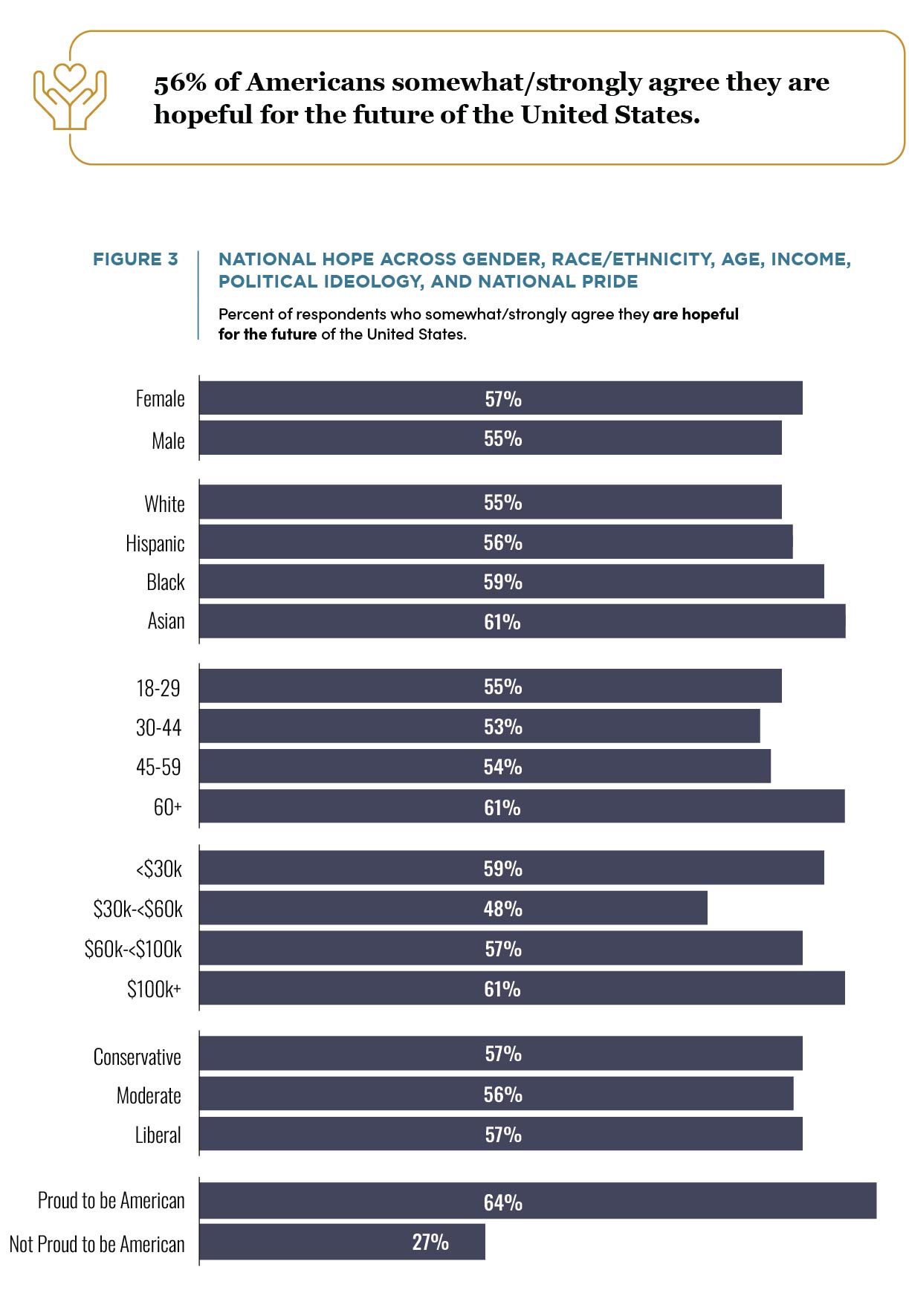
A closer analysis of the data reveals that there are notable differences in national hope when both age and political ideology are considered together. Older liberals are the group that is the most hopeful for the future of the nation. Among Americans aged 60 and older, liberals (76%) are more hopeful for the future of the nation than conservatives (61%) and moderates (56%). Young liberals are the group that is the least hopeful for the future of the nation. Among Americans under the age of 30, liberals (47%) are less hopeful for the future of the nation than conservatives (59%) and moderates (61%).
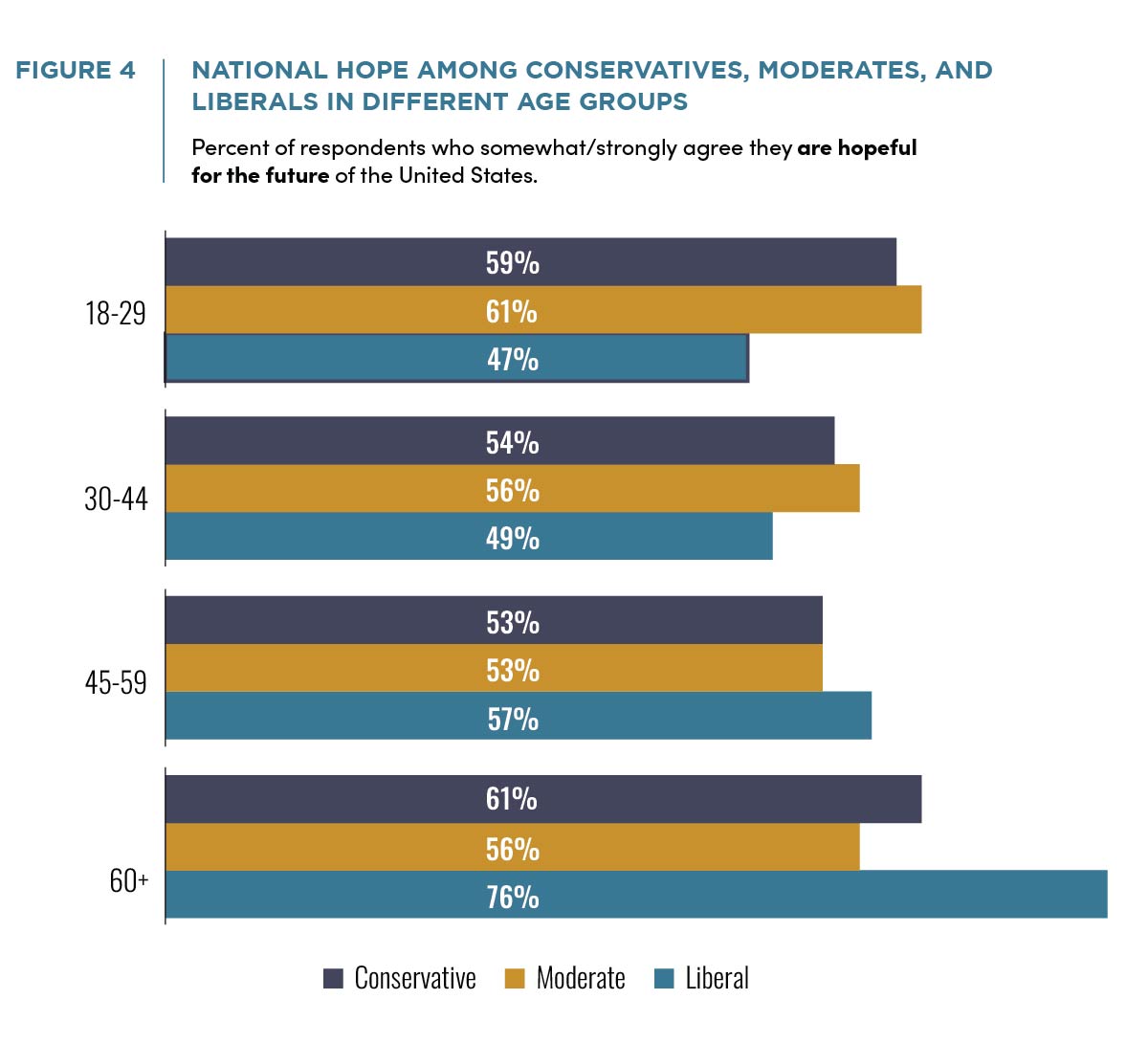
Importantly, national pride is the strongest predictor of national hope, with 64% of individuals who are proud to be American indicating that they are hopeful for the country’s future, compared to only 27% of those who are not proud to be American. Moreover, the relationship between national pride and national hope is observed across age groups and political ideologies.
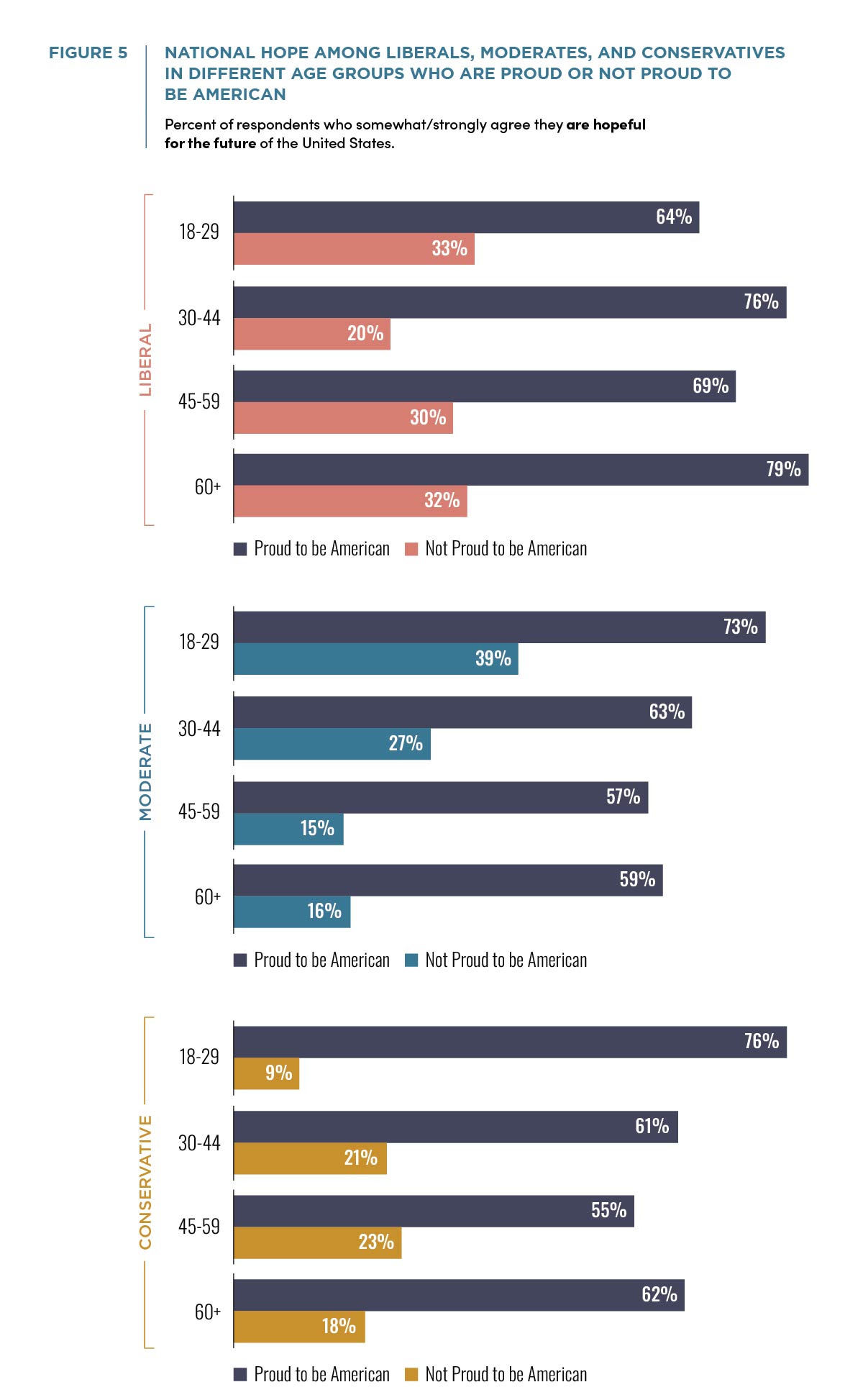
CONCLUSION
Personal liberty and pluralism are national characteristics that have greatly contributed to America’s economic, creative, and cultural flourishing. However, it is also vital for Americans to maintain a shared positive national identity. Patriotism can serve as a unifying force, enabling individuals with diverse beliefs to come together to address pressing challenges facing the nation.
The widening gap in national pride among younger generations, particularly between liberals and conservatives, represents a barrier to progress on issues that impact the psychological, social, and economic health of the nation.
However, the strong association between national pride and hope for the nation’s future, observed across all age groups and political ideologies, presents an opportunity. By fostering a shared sense of national belonging that transcends political differences, we may be able to cultivate a more hopeful and aspirational vision for the country.
Leaders across various sectors of society should recognize the importance of fostering a unifying and forward-looking national narrative that inspires hope, promotes understanding across differences, and motivates citizens to work together towards a better future, while preserving the commitment to liberty and pluralism that makes the United States a dynamic and prosperous nation. By embracing both personal freedom and national belonging, Americans can advance both individual and societal flourishing.
METHODOLOGY
For this survey, we partnered with NORC at the University of Chicago and its AmeriSpeak® panel. AmeriSpeak® is a probability-based panel designed to represent the US household population. Randomly selected US households are sampled using area probability and address-based sampling, with a known, nonzero probability of selection from the NORC National Sample Frame. The nationally representative sample consisted of 2,049 respondents. The survey was conducted from October 5-9, 2023.

A project of the Archbridge Institute
The Archbridge Institute is a non-partisan, independent, 501(c)(3) public policy think tank. Our mission is to lift barriers to human flourishing.
Sign Up For Our Newsletter
Contact
Archbridge Institute
1633 Connecticut Ave. NW, Suite 300,
Washington, DC 20009

